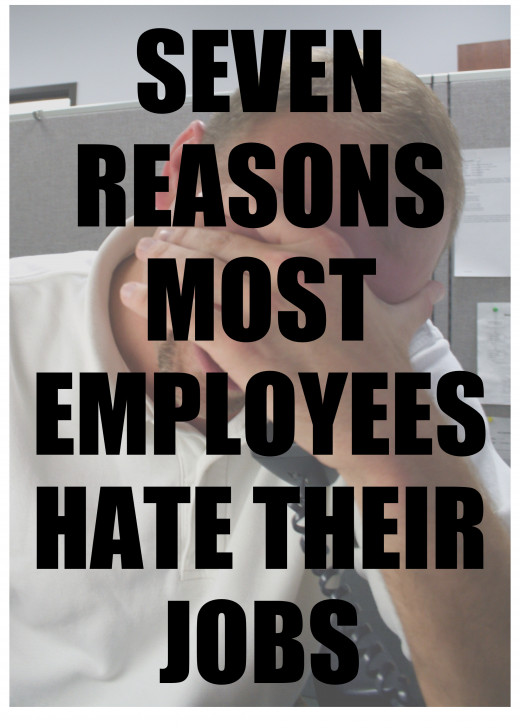Seven reasons most employees hate their jobs



What is employee engagement?
The term “employee engagement” is a management concept that expresses the desire for employees as being fully involved and enthusiastic about their job. Engaged employees treat the company as their own and consistently act in a manner that furthers the interest of their company. They are referred to as team players and are always willing to go the extra mile to meet goals established by management. They put the interest of the company before their own and never complain about policy changes or changes in job responsibilities even if those changes negatively impact their quality of life or their individual or personal goals. These employees are the first to arrive and the last to leave. They are also likely to describe their company as a great place to work and suggest friends, family, and acquaintances work there. The opposite of the engaged employee is the active resister, actively disengaged or zombie employee who meanders through the day cheating the company out of work and not making a contribution to his employer’s bottom line.

Do most employees enjoy their jobs?
The answer is a resounding no. Since 2000 results of Gall-up polls have revealed that only about 30% of employees are engaged in their jobs. The rest (over 70%) are either not engaged or actively disengaged. In fact, in the 3rd quarter of 2011, near 20% of employees (1 in 5) could be described as zombie employees. Those employees with at least some college training are more likely to be disengaged than those who did not attend college. Employees aged 30 to 64 are more likely to be disengaged from work compared to employees who are younger or older. Lastly, men are most likely to be disengaged than women.
The findings of polls indicate that there is a correlation between employee engagement and productivity and profits: more engaged employees mean a better bottom line of company owners.
More concerning is that a majority of the country’s highly-skilled employees who are in their peaking earning years don’t enjoy how they spend the majority of their day and they feel that way every day. They want to be somewhere else or doing something else. They merely exist in the workplace.
Now think about the cost of that reality in terms of wasted human potential and not in terms of corporate dollars and cents. How many people have forgotten what it feels like to happy and enjoy the task at hand just for the sake of doing it? How many potentially great minds have accepted a life of mediocrity simply because they have forgotten how to be engaged? How many innovations and breakthroughs have slipped through the cracks because a person was simply putting in his or her time and wasn’t interested in doing more.

Are you an engaged employee or zombie?
Reasons most employees hate their jobs
According to business reports and management consultants, employees hate their jobs for a number of reasons. These include:
1. Unclear expectations or changing job responsibilities. If a new hire is not given clear expectations early, they are likely to disengage. If the job responsibilities or immediate manager changes shortly after someone is hired they are likely to become disengaged.
2. Lack of resources. If a manager requires an employee to do a job and does not provide the proper resources and does not know how to gain access to them, the employee is likely to become disengaged.
3. Individual strengths and input are not valued. The employee is doing a job that does not match their strengths because of a resource shortage.
4. Insufficient pay and lack of recognition. People are not paid enough to make ends meet or they are asked to do more work for less money.
5. Lack of transparency regarding company decisions and lack of trust. Upper management is unethical and makes decisions without input from people directly impacted by policy changes.
6. Ineffective formal evaluations. Evaluations (or sporadic evaluations) serve as an opportunity for management to even scores instead of set goals and offer valuable feedback.
7. Overwork and lack of work-life balance. The employee feels that instead of working for a company, they are owned by it and they are obliged to give up their personal lives to meet company goals.
Missing from the list is the constant threat of downsizing and outsourcing. No one discusses why an employee should go the extra mile for a company, when there is a very real possibility that efforts would result in the loss of a job. Letters of recommendation are fine, but in an environment of high unemployment, they don’t pay the bills. Another little discussed reason for employee disengagement is related to anti-poaching practices by companies like Apple that prevent highly skilled employees from accepting better paying jobs or jobs that offer more autonomy, flexibility or expanded responsibilities at competitors. Sadly, the same anti-poaching practices occur in factory and agriculture jobs. Finally, missing is the reality of bully managers and hostile work environments. The presence of one or the other or both can lead to disengagement.
With all of the research done on employee engagement, one would think that the issue is easily resolved. That is the not the case. High level of employee disengagement remain constant.
Perhaps management consultants are looking for the solution in the wrong place. Instead of looking to management to improve employee engagement (which is kind of patriarchal or matriarchal when you think about it), why not move the responsibility to the employee. After all, they are the ones wasting their lives and talent.

Do you hate your job?
The first step for the employee to take control of their work life and career trajectory is to establish if he or she is a zombie.
Ask yourself the following questions:
1. Would you quit your job if you won the Powerball? What about $250000? $25000?
2. Do you find yourself taking holidays that don’t apply to you? Are you constantly looking for reasons to miss work?
3. Were you disappointed when you realized that you would not be laid off?
4. Do you and your manager point fingers at each other a lot?
5. Are you interested in collaborating or cooperating with colleagues?
6. Do you take advantage of any training or learning opportunities offered by your company?
7. Someone asks you if they should take a position at your company. You say no with all sincerity.
8. Do you care about your company’s customer? DO you care about the feedback they leave for you?
9. You do what you need to do. Do you try to innovate? Do you initiate projects?
10. Do share your ideas with management?
11. Are you bored most of the time?
If you answered yes to any of these questions, you may a zombie. If you answered yes to most of them you are the one who is killing the morale of the 1 in 3 employees who are engaged. You are a zombie and you are wasting your life and time.

Steps to take if you are a zombie?
After you establish that you are a zombie, you take the following steps:
1. You have to admit that regardless of who signs the check, you work for yourself. Would you hire yourself at this moment? What are your goals? How do you define success?
2. Determine why you are in this situation. Is it one of the seven main reasons for employee disengagement or something else? Determining why you feel the way you do helps you take the next step.
3. Talk to your manager to see if anything can be done about the problems you have with your job.
4. If your manager makes a legitimate effort to improve your job environment, you should embrace the opportunity and seek out job activities to become not only engaged not only at work but also in life.
5. If your manager is not interested in why you are disengaged or wants to tell you why they believe you disengaged or really can’t do anything about it, it is your responsibility as an adult to either resolve to improve your job through other channels or seek opportunities elsewhere. If your personal goals are not in sync with that of your company, it is your responsibility to move on.
6. If you decide to seek out another opportunity, make a list of things you really enjoyed about your job. This includes things you would do for free, projects you initiated, anything that you felt passionate about and move your job search in that direction.
7. If you can’t move on then, you should put your efforts into an activity (outside work) that you enjoy just for the sake of doing it. Work to become excellent in that endeavor. In doing this, you will learn to become engaged in work and life again and your efforts will soon seep in all areas of your life.





